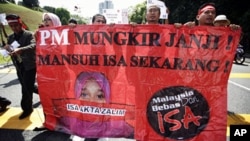A law aimed at preventing police from detaining suspects indefinitely or arresting them for their political beliefs has been approved by Malaysia's parliament.
The legislation, passed Tuesday by the lower house of parliament, replaces the notorious 1960 Internal Security Act, a draconian law long used to detain opposition leaders and other government critics without trial.
The new law, which limits detentions without charge to 28 days, was introduced last week by Prime Minister Najib Razak, just months ahead of expected national elections. The legislation also says no one can be arrested on the basis of their "political affiliation, activity or belief."
Opposition leaders and activists have welcomed the new legislation, which requires the formality of endorsements by parliament's upper house and the country's constitutional monarch before becoming law.
Some analysts said Najib was forced to back the legislation as his National Front party struggles to maintain its parliamentary majority in the face of opposition demands for improved human rights and greater government transparency.
William Case, the acting head of the Department of Asian and International Studies at the City University of Hong Kong, said much of the impetus for the new legislation was generated last year by major street demonstrations, known as the Bersih ("clean elections") protests, in the capital, Kuala Lumpur.
"It was, I believe 2010. The Clean Elections Movement mounted a major demonstration in Kuala Lumpur," said Case. "It was a very large and very vigorous set of street processions, which the police then reacted to with unusual force.Police have not always been very accommodating, but this time the repression was quite severe."
Case said the police crackdown, which resulted in hundreds of arrests and mounting public pressure against the government, pushed the prime minister toward reforms, which included promises to ease restrictions on media, free speech and assembly.




